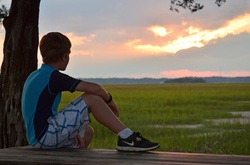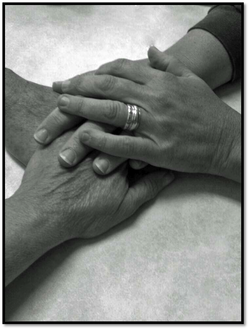Speaking of grief is speaking the language of the heart. Words come painfully slowly at times and sometimes they flow-on like a bursting spring creek. I've always been a collecting of stories. And a year or so ago I began to dream a book. Have you ever heard the phrase of "having a book in you"? Well that felt very true to me. And because my work now with hospice is companioning families and friends for a year after death, "the book in me" was about stories of grief. When I began writing the stories came out - one after another. It shouldn't have been a surprise (but it was) that many stories for this book are about my parents. Mom died in October of 2005 and Dad died in October of 2010. So I'll be sharing some of the writings from the book here in this place. I'll add a new chapter every now and then, just so you can catch a glimpse. Every piece ends with a question for the reader - and here is mine for you: "What is the notion of the book that is in you?"
RELYING ON THE MOON: COMPANIONING GRIEF FOR 29 DAYS

Trust What You Know to Be True
In the midst of the everyday hurry and scurry of life, there is grief. In our hustling and bustling it can become easier to turn our backs on our hearts or stuff our feelings down deep inside us. We find it easier to put our tender feelings on hold until there’s a “better time” to deal with it. And we all know that a better time rarely comes.
One gift of living with our grief is our discovery of ourselves in new ways. Grief is work. Rarely is there an organic healing. This work takes patience and risk. Through this work we can often discover compassion for ourselves and others. I believe that in this work, we can learn a great deal about trust.
As we come to the place where we can trust what we know, then a part of the work is in place. In Natalie Sleeth’s Hymn of Promise she reminds us that “in our end is our beginning.” Just as the moon travels in cycles, so our life lessons change and transform as we watch and wait. As we learn about patience and risk, about compassion and trust, we can awaken to our deepest wells of wisdom. This grief experience is our soul’s work. It is in these hours and days that we are brought to the heart of what matters.
It is true that there are teachers and guides all around us. And it is so important that we stay open to learning from them along the way. But we need to always keep close to a greater truth: we are our own most trusted guides. We know ourselves better than anyone else on the planet. Our stories are our own. We live in our bodies. We know what brings us tears and laughter. When we are able to trust what we know to be true, we will best be able to bear witness as the healing happens.
In the midst of the everyday hurry and scurry of life, there is grief. In our hustling and bustling it can become easier to turn our backs on our hearts or stuff our feelings down deep inside us. We find it easier to put our tender feelings on hold until there’s a “better time” to deal with it. And we all know that a better time rarely comes.
One gift of living with our grief is our discovery of ourselves in new ways. Grief is work. Rarely is there an organic healing. This work takes patience and risk. Through this work we can often discover compassion for ourselves and others. I believe that in this work, we can learn a great deal about trust.
As we come to the place where we can trust what we know, then a part of the work is in place. In Natalie Sleeth’s Hymn of Promise she reminds us that “in our end is our beginning.” Just as the moon travels in cycles, so our life lessons change and transform as we watch and wait. As we learn about patience and risk, about compassion and trust, we can awaken to our deepest wells of wisdom. This grief experience is our soul’s work. It is in these hours and days that we are brought to the heart of what matters.
It is true that there are teachers and guides all around us. And it is so important that we stay open to learning from them along the way. But we need to always keep close to a greater truth: we are our own most trusted guides. We know ourselves better than anyone else on the planet. Our stories are our own. We live in our bodies. We know what brings us tears and laughter. When we are able to trust what we know to be true, we will best be able to bear witness as the healing happens.
Evans

(Two breakfasts this morning ~ what a treat. First with Susie [missing the other Booth 25 gals] immediately followed by Round 2 with sisters, Claudia and Betsey and childhood friend Tom and his partner, Charles. Lovely...here's the Evans chapter from the book. 5.25.13)
- - - - - - - - - - - - - - - - - - - - - - - - - - - - - - - - - - - - - - - - -
Evans Fine Foods
Maybe we owe it to the TV show Cheers that made it so popular, but I think many of us instinctively know we need a place where we are known and accepted as we are. I can still hear the chorus, “You wanna go where everybody knows your name.” And if not everybody…at least somebody nods your way when you walk in.
My favorite restaurant Evans Fine Foods has become that Cheers place for me over these past years. I don’t remember when I first started having breakfast there, but I know that it has become a place of sanctuary for me. We are pilgrims from all walks of life who come in for pancakes or scrambled eggs or both. It was the first place my partner Linda and I brought second son Sam when he was tiny, tiny. We ate with him as our centerpiece. I can’t begin to count how many pancakes and sausage patties our sons Brogan and Sam have put away over the years. And, even as Dad struggled with Alzheimer’s, it was a safe place we could go with Mom and Dad. Folks aren’t on ceremony there. Martha (who doubles as wait person and pastor) meets you where you are and treats you with a dignity that is celebrated by the angels.
As dearly as I love this place, I am beginning to hear the echoes of Robert Frost’s tender words, “…so dawn goes down to day, nothing gold can stay.” Truer words were never threatened. I hate the truth of that. As loss accumulates with loss, I know that at some point I will lose this, too. Part of me wants to protect myself from this future pain. But it doesn’t make sense to me to stop going to a place I love because sometime in the future something will change and I will surely lose it. Even as I know it to be true, I can’t, I won’t, let my living be consumed with my anticipation of grief. I love this place and people so much, that I know it soon will change. Just because I am afraid of losing it, I shouldn’t quit living it.
And besides, I’m meeting with my Spiritual Director, Sister Margaret next Tuesday morning. We have a standing date for pancakes, cribbage and talks of prayer. And on Saturday I’m meeting with my buddies in Booth 25. Who in their right mind would pass that up?
- - - - - - - - - - - - - - - - - - - - - - - - - - - - - - - - - - - - - - - - -
Evans Fine Foods
Maybe we owe it to the TV show Cheers that made it so popular, but I think many of us instinctively know we need a place where we are known and accepted as we are. I can still hear the chorus, “You wanna go where everybody knows your name.” And if not everybody…at least somebody nods your way when you walk in.
My favorite restaurant Evans Fine Foods has become that Cheers place for me over these past years. I don’t remember when I first started having breakfast there, but I know that it has become a place of sanctuary for me. We are pilgrims from all walks of life who come in for pancakes or scrambled eggs or both. It was the first place my partner Linda and I brought second son Sam when he was tiny, tiny. We ate with him as our centerpiece. I can’t begin to count how many pancakes and sausage patties our sons Brogan and Sam have put away over the years. And, even as Dad struggled with Alzheimer’s, it was a safe place we could go with Mom and Dad. Folks aren’t on ceremony there. Martha (who doubles as wait person and pastor) meets you where you are and treats you with a dignity that is celebrated by the angels.
As dearly as I love this place, I am beginning to hear the echoes of Robert Frost’s tender words, “…so dawn goes down to day, nothing gold can stay.” Truer words were never threatened. I hate the truth of that. As loss accumulates with loss, I know that at some point I will lose this, too. Part of me wants to protect myself from this future pain. But it doesn’t make sense to me to stop going to a place I love because sometime in the future something will change and I will surely lose it. Even as I know it to be true, I can’t, I won’t, let my living be consumed with my anticipation of grief. I love this place and people so much, that I know it soon will change. Just because I am afraid of losing it, I shouldn’t quit living it.
And besides, I’m meeting with my Spiritual Director, Sister Margaret next Tuesday morning. We have a standing date for pancakes, cribbage and talks of prayer. And on Saturday I’m meeting with my buddies in Booth 25. Who in their right mind would pass that up?
RELYING ON THE MOON: COMPANIONING GRIEF FOR 29 DAYS

Beginning Words
The moon and grief share similar patterns and cycles. Both are ever-changing and moving in directions that are recognizable and perhaps even trackable. Neither is linear. Neither occurs in isolation; instead one night moves toward the next – for both the moon and grief. It is my hope that the moon can be a visible and viable representation for your experience of grief.
The notion of this book was first dreamed on a Full Moon night in the late spring of 2005. I was walking Mary Fran out to her car parked in our driveway.
My relationship with Mary Fran has always been a conundrum to describe. Technically, she is my mother’s older cousin. I can hear her starting already, “Well, Les, I’m hardly older than Barb. Not even a month, you sure you want to count that?” A truer description is that she is a generous and hilarious soul and she is kin to me.
She and daughter, Sam, had come to Atlanta to visit Mom who was living her final months with lung cancer. Mom and Mary Fran had grown up together and loved one another for two lifetimes. Cousin Mary Fran was heading back to the Pacific Northwest the next day, and she and Mom had just said what she feared was her last good-bye.
As Mary Fran and I walked to the car, we both looked up at the Full Moon and stood under it, trying to let our hearts catch up. “I don’t know how I’m gonna do this,” she said to me. “I don’t think I can.” We stood there side-by-side under the full light.
I don’t remember my exact words, but I said something about the steadiness, the sureness, the faithfulness. I told her that I would hold her in my heart,
especially on nights when the moon was full. And I told her that even though I didn’t completely understand it, I believed that Mom would be seeing the same moon that we were.
She and I gave one another a long and tender hug, and after she and her daughter had backed out of our driveway, I returned to the house to share the same story with Mom.
The moon and grief share similar patterns and cycles. Both are ever-changing and moving in directions that are recognizable and perhaps even trackable. Neither is linear. Neither occurs in isolation; instead one night moves toward the next – for both the moon and grief. It is my hope that the moon can be a visible and viable representation for your experience of grief.
The notion of this book was first dreamed on a Full Moon night in the late spring of 2005. I was walking Mary Fran out to her car parked in our driveway.
My relationship with Mary Fran has always been a conundrum to describe. Technically, she is my mother’s older cousin. I can hear her starting already, “Well, Les, I’m hardly older than Barb. Not even a month, you sure you want to count that?” A truer description is that she is a generous and hilarious soul and she is kin to me.
She and daughter, Sam, had come to Atlanta to visit Mom who was living her final months with lung cancer. Mom and Mary Fran had grown up together and loved one another for two lifetimes. Cousin Mary Fran was heading back to the Pacific Northwest the next day, and she and Mom had just said what she feared was her last good-bye.
As Mary Fran and I walked to the car, we both looked up at the Full Moon and stood under it, trying to let our hearts catch up. “I don’t know how I’m gonna do this,” she said to me. “I don’t think I can.” We stood there side-by-side under the full light.
I don’t remember my exact words, but I said something about the steadiness, the sureness, the faithfulness. I told her that I would hold her in my heart,
especially on nights when the moon was full. And I told her that even though I didn’t completely understand it, I believed that Mom would be seeing the same moon that we were.
She and I gave one another a long and tender hug, and after she and her daughter had backed out of our driveway, I returned to the house to share the same story with Mom.